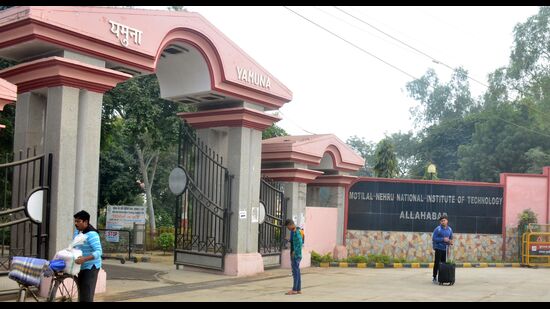MNNIT to now also offer BTech in material engineering
Currently, MNNIT offers BTech courses in nine branches including electronics, mechanical, civil, electrical, computer science, biotechnology, chemical engineering, production engineering as well as engineering and computational mechanics
Uttar Pradesh’s lone NIT—Motilal Nehru National Institute of Technology (MNNIT)-Allahabad— will now offer a new course in BTech (Material Engineering) on its campus from 2024-25 academic session.

This new course will be offered by the institute’s applied mechanics department and admissions will be made akin to other BTech courses offered by it against 30 seats, MNNIT officials said.
This will be the 10th BTech stream to be introduced at MNNIT, they added.
Currently, MNNIT offers BTech courses in nine branches including electronics, mechanical, civil, electrical, computer science, biotechnology, chemical engineering, production engineering as well as engineering and computational mechanics.
The students who enroll for the course will study to make, test and experiment with substances and work with metals, ceramics, and plastics to create new materials, different products. Along with this, the students will also study and learn about artificial intelligence and machine learning, the officials said.
The institute has received the approval to start the course from the next academic session. It has also got the go-ahead to participate in the admission process through the centralised seat-allocation process (CSAP), they said.
In this eight-semester programme, prepared as per provisions of the new National Education Policy (NEP)-2020, business ethics and social values will also be taught to the students as additional academic activities, said MNNIT’s dean (academic) Prof LK Mishra.
He explained that material engineers study the properties and structures of metals, ceramics, plastics, composites, nanomaterials (extremely small substances), and other substances in order to create new materials that meet certain mechanical, electrical, and chemical requirements. They also help select materials for specific products and develop new ways to use existing materials, he added.
Material engineers also perform computational work to understand and model the characteristics of materials and their components. They solve problems in several different engineering fields, such as mechanical, chemical, electrical, civil, nuclear, and aerospace.
They also have the option to specialise in understanding specific types of materials, for eg, ceramic engineers (developing ceramic materials and the processes for making them into useful products, from high-temperature rocket nozzles to glass for LCD flat-panel displays), composites engineers (developing materials with special, engineered properties for applications in aircraft, automobiles, and related products), metallurgical engineers (specialising in metals, such as steel and aluminum, usually in alloyed form with additions of other elements to provide specific properties) to plastics engineers (developing and testing new plastics, known as polymers, for new applications) or semiconductor processing engineers (applying materials science and engineering principles to develop new microelectronic materials for computing, sensing, and related applications).





